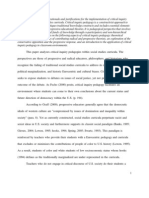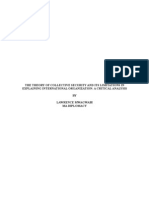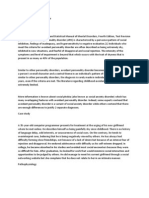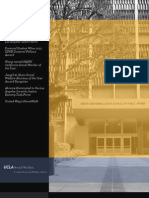Immigration Literature Review
Immigration Literature Review
Uploaded by
api-271864425Copyright:
Available Formats
Immigration Literature Review
Immigration Literature Review
Uploaded by
api-271864425Original Title
Copyright
Available Formats
Share this document
Did you find this document useful?
Is this content inappropriate?
Copyright:
Available Formats
Immigration Literature Review
Immigration Literature Review
Uploaded by
api-271864425Copyright:
Available Formats
Running Head: IMMIGRATION
Immigration Literature Review
Emma Diaz
University of Texas at El Paso
Abstract
This literature review analyzes the different perspectives people among the U.S have on the issue
of immigration. It includes examples of how immigrants are reacting and how they are trying to
take action in different places throughout the country. Also the different ways that people feel
culturally threatened because of the traditions and languages they bring to the U.S, and lastly, it
examines how some people believe that immigrants have negatively and positively impacted the
economy in the United States. By using different articles such as academic journals, newspapers,
and magazines, information was collected to study this issue and its many controversial aspects.
Introduction: Immigration Literature Review
Of the many facets of globalization, immigration is arguably the most controversial and
politically charged (Malhotra, 2013). People among the United States have various different
opinions on this issue, for example some people oppose it due to their fear of economic and
cultural changes to the country, while other individuals support it because they believe
immigrants deserve an opportunity to stay in the U.S.
This literature review will analyze the different points of view people in the United States
have on immigration, and some of the concerns people have over the issue. For this purpose
these three questions will be answered:
1.) Are there some efforts taken by immigrants to stay in this country?
2.) Do some people in the U.S feel culturally threatened because of the income of
immigrants?
3.) Is there an impact on the U.S economy because of incoming immigrants?
It would be difficult to make everyone agree with the same idea because everyone has
their own opinions that cause them to either support or oppose immigration. Although before
making that decision one must fully investigate the advantages and disadvantages immigrants
bring to the United States. The investigation of this issue can help one become more
knowledgeable thus, in the future have better evidence when stating an opinion on the topic.
Are there efforts some efforts taken by immigrants to stay in this country?
Whether people support or oppose this issue, immigrants throughout their daily lives
make efforts to convince the government to give them an opportunity to stay in the United
States. It can be by protesting out in the streets to developing new ideas that will somehow
benefit the country. For example, young immigrants have made different types of protests to ask
the government to give them the opportunity to go to college, the so called Dreamers. One of
those protest took place in Miami, a group of young immigrants started a walk from Miami to
Washington D.C with the purpose to show the government that they wanted to see more action
on reform policies (Preston, 2010).
Even if some of these individuals find a way to go to college, for example those accepted
on the Dream Act, after getting their education their legal status still impedes them to take a job.
However, some of these immigrants have found another ways to make money in order to sustain
themselves and their families. For example, 20 year old Carla Chavarria developed a business in
graphic design, her work is sometimes so immense that she has to hire individuals that can
actually work legally in the United States (Carcamo 2013).
Immigrants are not only taking advantage of those opportunities, but also from other
types of aid offered by individuals who support immigration. Perhaps, immigrants trying to
obtain their citizenship require legal representation, and it is sometimes offered by different
organizations that can provide those services at low-cost or even sometimes for free. Of the
many different organizations there is the American Bar Association and the State Bar of Texas,
whom each year participate in an event called National Pro Bono Celebration. In this event,
attorneys offer their services to many of those needed immigrants in order to help them with their
legal process (Davis 2014).
Do some people in the U.S feel culturally threatened because of the income of immigrants?
Some individuals may sometimes feel threatened by immigrants because once they arrive
in this country, they bring with them part of their culture and traditions. Cultural threat,
characterized by the perception that immigrants threaten the American identity and culture.
(Newman 2013, p.374) As said in this quote people in the U.S fear that the common American
traditions will eventually disappear due to the new traditions brought by immigrants.
A national survey of nearly 3,000 Latinos1 reveals that 62% of first-generation Hispanic
immigrants, or 11 million people, speak little to no English in the United States. (Hartman et.al,
2012, p.635). As these writers said, another idea that people in the U.S disapprove is the
enormous introduction of the Spanish language to the country. Some people believe immigrants
should be the responsible to learn English rather than Americans having to learn Spanish.
Although as this issue is so controversial nearly all Latinos (88%) say that it is important for
future generations living in the United States to maintain their ability to speak Spanish
(Hartman et.al, 2012, p.636).
Some individuals also believe that immigrants should adjust to the way of life of the
Americans and their culture, which is developed by the acculturation process, a process
characterized by the displacement of the original cultural patterns of a group, followed by a
period of cultural adjustment and change (Hartman et.al, 2012, p.638).
Nobody knows in reality what the right answer to this problem is, if whether one should
learn Spanish, or immigrants should learn English, and if immigrants should forget about their
culture or keep it with them, but it is always useful to investigate the different opinions people
have about this demanding issue.
Is there an impact on the U.S economy because of incoming immigrants?
Apart from a cultural threat to Americans, there also exists an economic threat. People
who oppose immigration feel like immigrants cause economic problems to the United States in
various different ways. For example one of the issues involved in the economic threat is, the
competition that immigrants pose for jobseither replacing native workers or suppressing their
wages. (Malhotra et.al, 2013, p.392). This causes opposition to immigration because people in
the U.S want jobs to be taken by citizens of this country and not individuals from another
country.
Another economic factor is the pressure that immigrants put on national, state, and local
social welfare agencies may boost opposition due to the fears of increased taxation, educational
costs, and other burdens on infrastructure (Coenders & Scheepers, 1998; Quillian, 1995)
(Brader et. al, 2013, p.150). Because of this issue people are afraid the economy will go down
due to all these costs that the government has to cover on not only U.S citizens but also
immigrants.
Although, as said before every factor in this issue is very controversial, just as some
people may see economic threats because of the taxes, welfare and job positions taken by
immigrants, others may look at it in a different way and might support immigration because of
the jobs implemented by illegal immigrants who develop their own businesses and hire U.S
citizens as mentioned before. Once again one cannot know what the right answer to this issue is
but is always beneficial to know how the economy is impacted due to the many incoming
immigrants.
Conclusion
As a result, one can conclude that immigration is a very controversial topic that has
impacted the U.S in many different ways, thus it is important to be informed about it even if
there are multiple perspectives about it.
There has been and always will be a controversy over immigration. Some individuals will
support it and others will oppose it and they may have their reason to believe that. It is possible
that there will still be economic and cultural threats and maybe even other different threats.
Although before one can make a decision and state their opinion, one must investigate the
various perspectives of the problem and find out why those viewpoints exist.
Becoming more knowledgeable about this issue can help individuals make up their own
opinions, and can also help the government find a solution to this problem. For example, as this
literature review does, by researching various articles that show different outlooks from different
people about the problem of immigration. At the end, even after all the research, one may not
have the exact right answer to the problem, but it is still helpful to know this information because
it serves as evidence from the different points of view on the topic.
References page
Brader, T., Jardina, A.E., & Valentino, N.A. (2013). Immigration opposition among U.S
whites: general ethnocentrism or media priming of attitudes about latinos. Political
Psychology, 34(2), p149-166
Carcamo, C. (2013, September 14). Immigrants lacking papers work legally as their own
busses. Los Angeles Times. Retrieved from http://www.latimes.com/
Davis, D. O. (2014, October 24). Ouisa D. Davis: El Paso lawyers offer free aid Saturday
those in need. El Paso Times. Retrieved from http://elpasotimes.com/
Dinnerstein, L., & Reimers, D. M. (2014). The Era of Latinos, 1965-1990. The World Comes to
America. (pp. 53-73). New York, NY: Oxford University Press.
Hartman, T.K., Newman, B.J., & Taber, C.S. (2012). Foreign Language Exposure, Cultural
Threat and Opposition to Immigration. Political Psychology, 33(5), 635-657.
Hyunjun Mo, C., Malhotra, N. & Margalit, Y. (2013). Economic explanation for opposition to
immigration: distinguishing between prevalence and conditional impact. American
Journal of Political Science, 57(2), p. 391-410.
Newman, B.J. (2013). Acculturating contexts and anglo opposition to immigration in the United
States. American Journal of Political Science, 57(2), p. 391-410.
Preston, J. (2010, March). Raised in the U.S., but still illegal. The New York Times Upfront.
Retrieved from http://upfront.scholastic.com
You might also like
- Theory Application in White OleanderDocument8 pagesTheory Application in White Oleanderapi-503235879No ratings yet
- 3.sample Suicide Intervention ScriptDocument3 pages3.sample Suicide Intervention Scriptfrhendrayani7007No ratings yet
- Ethics and Politics Cases and Comments PDFDocument2 pagesEthics and Politics Cases and Comments PDFLance0% (1)
- Persuasive Essay DraftDocument8 pagesPersuasive Essay Draftgzf5034No ratings yet
- Immigration and The U.S. Policy Debate - Part III - Immigration in The Twenty-First Century - The Choices ProgramDocument26 pagesImmigration and The U.S. Policy Debate - Part III - Immigration in The Twenty-First Century - The Choices ProgramMikayla YuNo ratings yet
- Homelessness English 1Document15 pagesHomelessness English 1api-488506124100% (1)
- Module 1 - Lesson 3 & 4Document15 pagesModule 1 - Lesson 3 & 4Meng NayttkuvaNo ratings yet
- Social Diagnosis PDFDocument520 pagesSocial Diagnosis PDFraazenNo ratings yet
- Presentation EssayDocument7 pagesPresentation Essayapi-272990360No ratings yet
- Moral RelativismDocument11 pagesMoral RelativismperpetualdreamerNo ratings yet
- Vol III, Issue 28, Nov.23-29Document23 pagesVol III, Issue 28, Nov.23-29FreeABQNo ratings yet
- Capitalism Vs CommunismDocument7 pagesCapitalism Vs CommunismhafizufazNo ratings yet
- Governmental PoliticsDocument15 pagesGovernmental PoliticsCleon Magayanes100% (1)
- Human Rights LAW: Quinnee S. VallejosDocument21 pagesHuman Rights LAW: Quinnee S. VallejosQuinnee VallejosNo ratings yet
- Chapter3 Types of ViolanceDocument81 pagesChapter3 Types of ViolanceMaan KhanNo ratings yet
- Welfare StateDocument3 pagesWelfare StateJahan Choudhury100% (1)
- Putins Foreign Policy Maio 2016Document9 pagesPutins Foreign Policy Maio 2016LuisNo ratings yet
- Race and RacismDocument9 pagesRace and RacismKeloka ConsultantsNo ratings yet
- Collective Behavior in Social PsychologyDocument6 pagesCollective Behavior in Social PsychologyBecerra SandovalNo ratings yet
- 1971 War On Drug Video ExplanationDocument4 pages1971 War On Drug Video ExplanationNina Perena100% (1)
- The Third Debate: Neorealism Versus Neoliberalism and Their Views On CooperationDocument8 pagesThe Third Debate: Neorealism Versus Neoliberalism and Their Views On CooperationAtif AliNo ratings yet
- Church State Corporation: Construing Religion in US LawFrom EverandChurch State Corporation: Construing Religion in US LawNo ratings yet
- Incorporating Critical Inquiry Pedagogy in Social Studies CurriculumDocument27 pagesIncorporating Critical Inquiry Pedagogy in Social Studies Curriculumnbowling100% (7)
- Psychology AggressionDocument15 pagesPsychology AggressionElias VouzounisNo ratings yet
- Discussion Material: 1. Definition of LiberalismDocument9 pagesDiscussion Material: 1. Definition of LiberalismRisca Permata Sari100% (1)
- Argument Against Gun Control - EssayDocument2 pagesArgument Against Gun Control - Essayalexis_iliadisNo ratings yet
- Capstone Paper OutlineDocument3 pagesCapstone Paper Outlineapi-395503981100% (1)
- When Government Chooses Your Car Study; Institute for Energy Research (IER)Document51 pagesWhen Government Chooses Your Car Study; Institute for Energy Research (IER)owenNo ratings yet
- Natural Boundary To Its Ambitions. For Violent Variants, Like So-CalledDocument4 pagesNatural Boundary To Its Ambitions. For Violent Variants, Like So-CalledsnokcsNo ratings yet
- Limits of ConfidentialityDocument3 pagesLimits of ConfidentialityKelvin Chin100% (1)
- Sociology Research PaperDocument13 pagesSociology Research Paperapi-354659919No ratings yet
- Impacts of Neoliberalism On Development 1Document8 pagesImpacts of Neoliberalism On Development 1Damilola Ade-OdiachiNo ratings yet
- Assignment Terrorism and Its Inpact On SocietyDocument6 pagesAssignment Terrorism and Its Inpact On SocietyNimra amirNo ratings yet
- International Relation ApproachesDocument12 pagesInternational Relation Approachesmazharsaeedbaig100% (1)
- Running Head: ALCOHOLISM 1Document10 pagesRunning Head: ALCOHOLISM 1Teresia NjoksNo ratings yet
- Social DemocracyDocument11 pagesSocial DemocracyMaria_Guimarae_3691No ratings yet
- Veterans Rebuilding Life: PTSD Training ManualDocument17 pagesVeterans Rebuilding Life: PTSD Training ManualEcate RinaNo ratings yet
- Classical Theories of Social StratificationDocument12 pagesClassical Theories of Social StratificationkathirNo ratings yet
- Sociological ImaginationDocument3 pagesSociological Imaginationpypyalice100% (2)
- Colvin 2002Document24 pagesColvin 2002José Manuel Salas100% (1)
- Famous Mathematics QuotesDocument22 pagesFamous Mathematics QuotesAuric Legato BiananNo ratings yet
- Role of Psychologist in Peace BuildingDocument5 pagesRole of Psychologist in Peace BuildingwongclarencerNo ratings yet
- The Counseling PsychologistDocument11 pagesThe Counseling PsychologistanitnerolNo ratings yet
- Summary of Max Weber and The Theory of The StateDocument3 pagesSummary of Max Weber and The Theory of The StateAtakamoszNo ratings yet
- Determinants of Human BehaviorDocument12 pagesDeterminants of Human BehaviorAnaoj28No ratings yet
- Crash Course U.S. Government and Politics 36 Election BasicsDocument2 pagesCrash Course U.S. Government and Politics 36 Election BasicsAisha AwwadNo ratings yet
- The Theory of Collective Security and Its Limitations in Explaining International OrganizationDocument22 pagesThe Theory of Collective Security and Its Limitations in Explaining International Organizationjuris1188No ratings yet
- Adam Smith On Wealth InequalityDocument7 pagesAdam Smith On Wealth InequalityThomas Johnson100% (1)
- Annotated BibliographyDocument6 pagesAnnotated Bibliographyapi-242113317100% (1)
- Avoidant Personality DisorderDocument9 pagesAvoidant Personality DisorderJenry Reyes TrispaNo ratings yet
- Democracy Declined: The Failed Politics of Consumer Financial ProtectionFrom EverandDemocracy Declined: The Failed Politics of Consumer Financial ProtectionNo ratings yet
- Federalism EssayDocument4 pagesFederalism EssayfabulousfibonacciNo ratings yet
- Understanding The Impact of Stigma On PeopleDocument5 pagesUnderstanding The Impact of Stigma On PeopleAlexandruIulianDorneanuNo ratings yet
- The NeoliberalismDocument4 pagesThe NeoliberalismBernie RivasNo ratings yet
- International RelationsDocument17 pagesInternational RelationspujajoshinepalNo ratings yet
- Walzer's Theory of Morality in International RelationsDocument25 pagesWalzer's Theory of Morality in International RelationsNikeBNo ratings yet
- Conservatism: Pros & ConsDocument7 pagesConservatism: Pros & ConsPete100% (1)
- Gramsci, Hegemony and Subaltern CultureDocument23 pagesGramsci, Hegemony and Subaltern CultureMohamed Umar FarooqNo ratings yet
- LESSON 1: Introduction: The Concepts of Politics and GovernanceDocument28 pagesLESSON 1: Introduction: The Concepts of Politics and GovernanceJohn Dave RacuyaNo ratings yet
- Durkheim On Crime and PunishmentDocument25 pagesDurkheim On Crime and PunishmentIon SanduNo ratings yet
- FD - Felony Disenfranchisement PrimerDocument12 pagesFD - Felony Disenfranchisement PrimerBitcoDavidNo ratings yet
- War On DrugsDocument8 pagesWar On Drugsthewizardess100% (1)
- MinilessonDocument2 pagesMinilessonapi-321726449No ratings yet
- January NewsletterDocument2 pagesJanuary Newsletterapi-271864425No ratings yet
- Radical Actions Used in Order To Defend A Religion? Not A Fair IdeaDocument4 pagesRadical Actions Used in Order To Defend A Religion? Not A Fair Ideaapi-271864425No ratings yet
- RUNNING HEAD: Charlie Hebdo Attack 1Document11 pagesRUNNING HEAD: Charlie Hebdo Attack 1api-271864425No ratings yet
- Running Head: Paris Attacks 1Document6 pagesRunning Head: Paris Attacks 1api-271864425No ratings yet
- Wallstreetjournaleurope 20170905 TheWallStreetJournal-EuropeDocument20 pagesWallstreetjournaleurope 20170905 TheWallStreetJournal-EuropestefanoNo ratings yet
- Advocacy PresentationDocument27 pagesAdvocacy Presentationapi-222304611No ratings yet
- Senior PortfolioDocument42 pagesSenior Portfolioapi-412826792No ratings yet
- FALL 2011: Inside This IssueDocument12 pagesFALL 2011: Inside This IssueLauraNo ratings yet
- Nevada Sagebrush Archives 09/21/10Document20 pagesNevada Sagebrush Archives 09/21/10The Nevada SagebrushNo ratings yet
- What Is GlobalizationDocument16 pagesWhat Is GlobalizationCHRISTINE REMY CANDELARIANo ratings yet
- Learning To Be Legal Transition Narratives of Joy and Survivor Guilt of Previously Undocumented 1 5 Generation Latinx Immigrants in The United StatesDocument17 pagesLearning To Be Legal Transition Narratives of Joy and Survivor Guilt of Previously Undocumented 1 5 Generation Latinx Immigrants in The United StatesAdisaka M HendiNo ratings yet
- Scholarship ApplicationDocument28 pagesScholarship ApplicationDrina Tobin100% (1)
- The Nubian News y El Latino News - Junio 2024Document12 pagesThe Nubian News y El Latino News - Junio 2024Marcos Tamayo CabreraNo ratings yet
- Memorandum of Contemporary IssueDocument9 pagesMemorandum of Contemporary Issueapi-350119975No ratings yet
- January Issue 2013Document19 pagesJanuary Issue 2013thewarrioronline_shsNo ratings yet
- 14 ff8 Digital Script 1 PDFDocument105 pages14 ff8 Digital Script 1 PDFPaulina OcampoNo ratings yet
- Cornyn Vote Helps End Dream Dallas Morning News The TX October 28 2007 P9aDocument2 pagesCornyn Vote Helps End Dream Dallas Morning News The TX October 28 2007 P9aGus BovaNo ratings yet
- Gov Research Paper FinalDocument7 pagesGov Research Paper Finalapi-302976636No ratings yet
- Senate Immigration Bill Summary April 17 2013Document4 pagesSenate Immigration Bill Summary April 17 2013DreamACTivistNo ratings yet
- Cornyn Should Hang His Head On Illegal-Alien Fort Worth Star-Telegram TX November 5 2007 PB11Document2 pagesCornyn Should Hang His Head On Illegal-Alien Fort Worth Star-Telegram TX November 5 2007 PB11Gus BovaNo ratings yet
- Outside Colby Vol 3 Issue 3Document23 pagesOutside Colby Vol 3 Issue 3Peter Grayson HamblettNo ratings yet
- Syllabus Template - Docx 3700-Canvas2Document11 pagesSyllabus Template - Docx 3700-Canvas2Kevin TranNo ratings yet
- Memorandum OpinionDocument30 pagesMemorandum OpinionWashington Examiner100% (2)
- Millennials' Attitudes Toward Immigrants and Immigration PoliciesDocument23 pagesMillennials' Attitudes Toward Immigrants and Immigration PoliciesopportunityagendaNo ratings yet
- Education Leaders DACA Stand For ChildrenDocument41 pagesEducation Leaders DACA Stand For Childrencorey_c_mitchell100% (1)
- Intermediate Accounting 15th Edition Kieso Weygandt Warfield Test BankDocument5 pagesIntermediate Accounting 15th Edition Kieso Weygandt Warfield Test Bankanie0% (1)
- Book Review - Generation Z Goes To CollegeDocument12 pagesBook Review - Generation Z Goes To CollegeLa Lie IzzinNo ratings yet
- Dream Act EssayDocument8 pagesDream Act Essayaxmljinbf100% (2)
- Caribbean Sun December 2010Document16 pagesCaribbean Sun December 2010Vanessa Chin ChuramanNo ratings yet
- The Occupied Vanderbilt HustlerDocument4 pagesThe Occupied Vanderbilt Hustlerben4353No ratings yet
- Englisch Facharbeit Über "The Dreamers"Document15 pagesEnglisch Facharbeit Über "The Dreamers"Emre TaşNo ratings yet






























































































